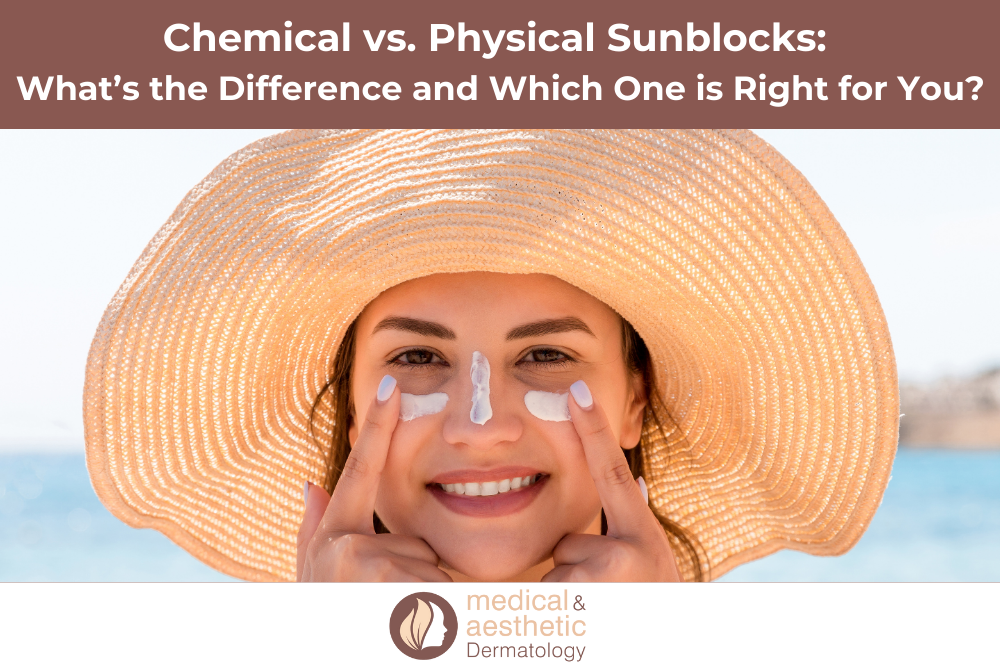 The importance of sunscreen in maintaining healthy skin cannot be overstated. Sunscreen is your skin’s first line of defense against harmful ultraviolet (UV) rays, which contribute to premature aging, hyperpigmentation, and skin cancer. However, with so many options on the market, choosing between chemical and physical sunblocks can be confusing. Understanding their differences can help you make an informed decision for optimal skin protection.
The importance of sunscreen in maintaining healthy skin cannot be overstated. Sunscreen is your skin’s first line of defense against harmful ultraviolet (UV) rays, which contribute to premature aging, hyperpigmentation, and skin cancer. However, with so many options on the market, choosing between chemical and physical sunblocks can be confusing. Understanding their differences can help you make an informed decision for optimal skin protection.
What Are Chemical Sunblocks?
Chemical sunblocks, also called chemical sunscreens, work by absorbing UV rays and converting them into heat, which is then released from the skin. These formulas contain active ingredients such as:
- Avobenzone
- Octinoxate
- Oxybenzone
- Homosalate
Advantages of Chemical Sunblocks:
- Lightweight Texture: Chemical sunscreens are often thinner, making them ideal for everyday wear and easy application under makeup.
- Water Resistance: Many chemical formulas are designed to resist water and sweat, making them suitable for outdoor activities or exercise.
- Broad-Spectrum Protection: They are effective at protecting against both UVA and UVB rays when formulated correctly.
Considerations:
- Skin Sensitivity: Some chemical sunscreens may irritate sensitive skin or eyes.
- Environmental Concerns: Certain chemical ingredients, such as oxybenzone, have been linked to coral reef damage.
What Are Physical Sunblocks?
Physical sunblocks, also known as mineral sunscreens, create a protective barrier on the skin’s surface to reflect UV rays away. These typically include active ingredients like:
- Zinc Oxide
- Titanium Dioxide
Advantages of Physical Sunblocks:
- Gentle on Skin: Mineral formulas are less likely to irritate sensitive skin, making them ideal for individuals with rosacea or acne.
- Immediate Protection: Physical sunblocks work as soon as they are applied, unlike chemical sunscreens that need about 20 minutes to activate.
- Eco-Friendly Options: Physical sunblocks are often considered safer for marine life and the environment.
Considerations:
- Thicker Texture: These formulas may leave a white cast on the skin, which can be noticeable on darker skin tones.
- Reapplication Needed: Physical sunblocks can rub off more easily and may require frequent reapplication.
How to Choose the Right Sunblock for You
When deciding between chemical and physical sunblocks, consider the following factors:
- Skin Type:
- Sensitive skin? Opt for a physical sunblock.
- Oily or acne-prone skin? Look for lightweight, non-comedogenic chemical options.
- Activity Level:
- For outdoor sports or swimming, a water-resistant chemical formula may be more practical.
- Environmental Concerns:
- If sustainability matters, choose reef-safe physical sunblocks.
- Cosmetic Preferences:
- If you prefer a sheer finish, chemical sunscreens are generally less noticeable.
Q&A: Your Sunscreen Questions Answered
Q: Is SPF the same for chemical and physical sunblocks?
A: Yes, SPF (Sun Protection Factor) measures protection against UVB rays and applies equally to both types of sunscreens. Always look for broad-spectrum protection to guard against UVA and UVB rays.
Q: Can I use chemical and physical sunblocks together?
A: Absolutely! Layering the two can provide enhanced protection. Apply the chemical sunscreen first, followed by the physical sunblock.
Q: Are physical sunblocks safe for babies and children?
A: Yes, physical sunblocks are generally recommended for young children due to their gentle, non-irritating ingredients.
Q: How often should I reapply sunscreen?
A: Reapply every two hours or after swimming, sweating, or towel drying.
Q: What is “reef-safe” sunscreen?
A: Reef-safe sunscreens avoid ingredients harmful to marine life, such as oxybenzone and octinoxate. Physical sunblocks are often labeled reef-safe.
Conclusion
Both chemical and physical sunblocks offer unique benefits, and the best choice depends on your individual needs, skin type, and lifestyle. Whichever you choose, applying sunscreen daily is one of the most effective ways to maintain healthy, youthful skin and prevent skin damage.
Contact Us
Medical & Aesthetic Dermatology
9256 Bendix Road, Suite 200A
Columbia, MD 21045
Phone: (443) 542-0505
For personalized skincare advice or help choosing the best sunscreen for your skin type, contact Medical & Aesthetic Dermatology today. Protect your skin—it’s your best defense!

